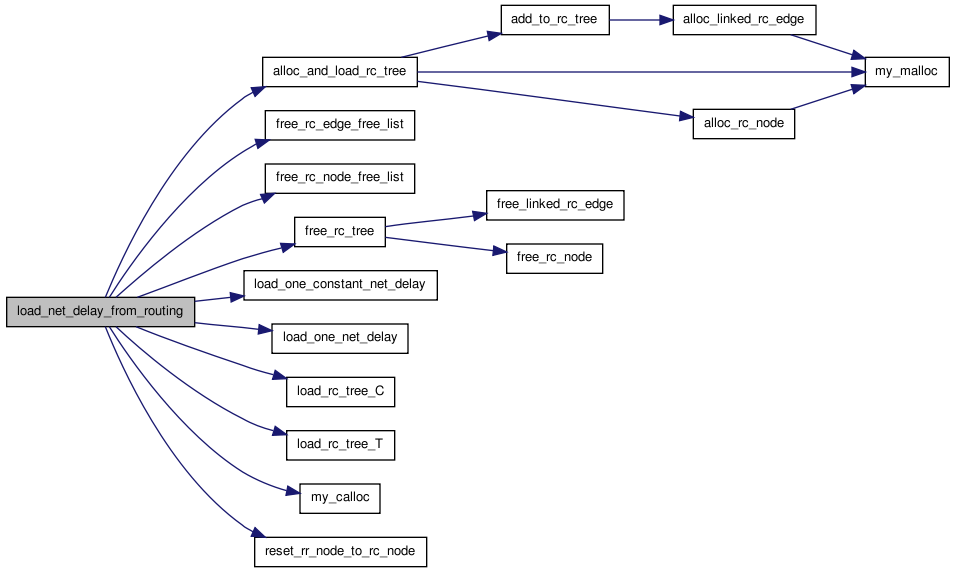vpr/SRC/timing/net_delay.h File Reference
 This graph shows which files directly or indirectly include this file:
This graph shows which files directly or indirectly include this file:Go to the source code of this file.
Functions | |
| float ** | alloc_net_delay (struct s_linked_vptr **chunk_list_head_ptr, struct s_net *nets, int n_nets) |
| void | free_net_delay (float **net_delay, struct s_linked_vptr **chunk_list_head_ptr) |
| void | load_net_delay_from_routing (float **net_delay, struct s_net *nets, int n_nets) |
| void | load_constant_net_delay (float **net_delay, float delay_value, struct s_net *nets, int n_nets) |
| void | print_net_delay (float **net_delay, char *fname, struct s_net *nets, int n_nets) |
Function Documentation
| float** alloc_net_delay | ( | struct s_linked_vptr ** | chunk_list_head_ptr, |
| struct s_net * | nets, | ||
| int | n_nets | ||
| ) |
Allocates space for the net_delay data structure [0..num_nets-1][1..num_pins-1]. I chunk the data to save space on large problems.
Definition at line 130 of file net_delay.c.
{
float **net_delay; /* [0..num_nets-1][1..num_pins-1] */
float *tmp_ptr;
int inet;
int chunk_bytes_avail;
char *chunk_next_avail_mem;
*chunk_list_head_ptr = NULL;
chunk_bytes_avail = 0;
chunk_next_avail_mem = NULL;
net_delay = (float **)my_malloc(n_nets * sizeof(float *));
for(inet = 0; inet < n_nets; inet++)
{
tmp_ptr =
(float *)my_chunk_malloc(((nets[inet].num_sinks + 1) - 1) *
sizeof(float), chunk_list_head_ptr,
&chunk_bytes_avail,
&chunk_next_avail_mem);
net_delay[inet] = tmp_ptr - 1; /* [1..num_pins-1] */
}
return (net_delay);
}
 Here is the call graph for this function:
Here is the call graph for this function: Here is the caller graph for this function:
Here is the caller graph for this function:| void free_net_delay | ( | float ** | net_delay, |
| struct s_linked_vptr ** | chunk_list_head_ptr | ||
| ) |
Frees the net_delay structure. Assumes it was chunk allocated.
Definition at line 162 of file net_delay.c.
{
free(net_delay);
free_chunk_memory(*chunk_list_head_ptr);
*chunk_list_head_ptr = NULL;
}
 Here is the call graph for this function:
Here is the call graph for this function: Here is the caller graph for this function:
Here is the caller graph for this function:| void load_constant_net_delay | ( | float ** | net_delay, |
| float | delay_value, | ||
| struct s_net * | nets, | ||
| int | n_nets | ||
| ) |
Loads the net_delay array with delay_value for every source - sink connection that is not on a global resource, and with 0. for every source
- sink connection on a global net. (This can be used to allow timing analysis before routing is done with a constant net delay model).
Definition at line 224 of file net_delay.c.
{
int inet;
for(inet = 0; inet < n_nets; inet++)
{
if(nets[inet].is_global)
{
load_one_constant_net_delay(net_delay, inet, nets, 0.);
}
else
{
load_one_constant_net_delay(net_delay, inet, nets, delay_value);
}
}
}
 Here is the call graph for this function:
Here is the call graph for this function: Here is the caller graph for this function:
Here is the caller graph for this function:| void load_net_delay_from_routing | ( | float ** | net_delay, |
| struct s_net * | nets, | ||
| int | n_nets | ||
| ) |
This routine loads net_delay[0..num_nets-1][1..num_pins-1]. Each entry is the Elmore delay from the net source to the appropriate sink. Both the rr_graph and the routing traceback must be completely constructed before this routine is called, and the net_delay array must have been allocated.
Definition at line 177 of file net_delay.c.
{
t_rc_node *rc_node_free_list, *rc_root;
t_linked_rc_edge *rc_edge_free_list;
int inet;
t_linked_rc_ptr *rr_node_to_rc_node; /* [0..num_rr_nodes-1] */
rr_node_to_rc_node = (t_linked_rc_ptr *) my_calloc(num_rr_nodes,
sizeof
(t_linked_rc_ptr));
rc_node_free_list = NULL;
rc_edge_free_list = NULL;
for(inet = 0; inet < n_nets; inet++)
{
if(nets[inet].is_global)
{
load_one_constant_net_delay(net_delay, inet, nets, 0.);
}
else
{
rc_root = alloc_and_load_rc_tree(inet, &rc_node_free_list,
&rc_edge_free_list,
rr_node_to_rc_node);
load_rc_tree_C(rc_root);
load_rc_tree_T(rc_root, 0.);
load_one_net_delay(net_delay, inet, nets, rr_node_to_rc_node);
free_rc_tree(rc_root, &rc_node_free_list,
&rc_edge_free_list);
reset_rr_node_to_rc_node(rr_node_to_rc_node, inet);
}
}
free_rc_node_free_list(rc_node_free_list);
free_rc_edge_free_list(rc_edge_free_list);
free(rr_node_to_rc_node);
}
 Here is the call graph for this function:
Here is the call graph for this function: Here is the caller graph for this function:
Here is the caller graph for this function:| void print_net_delay | ( | float ** | net_delay, |
| char * | fname, | ||
| struct s_net * | nets, | ||
| int | n_nets | ||
| ) |
Dumps the net delays into file fname.
Definition at line 685 of file net_delay.c.
{
FILE *fp;
int inet, ipin;
fp = my_fopen(fname, "w", 0);
for(inet = 0; inet < n_nets; inet++)
{
fprintf(fp, "Net: %d.\n", inet);
fprintf(fp, "Delays:");
for(ipin = 1; ipin < (nets[inet].num_sinks + 1); ipin++)
fprintf(fp, " %g", net_delay[inet][ipin]);
fprintf(fp, "\n\n");
}
fclose(fp);
}
 Here is the call graph for this function:
Here is the call graph for this function: Here is the caller graph for this function:
Here is the caller graph for this function:










